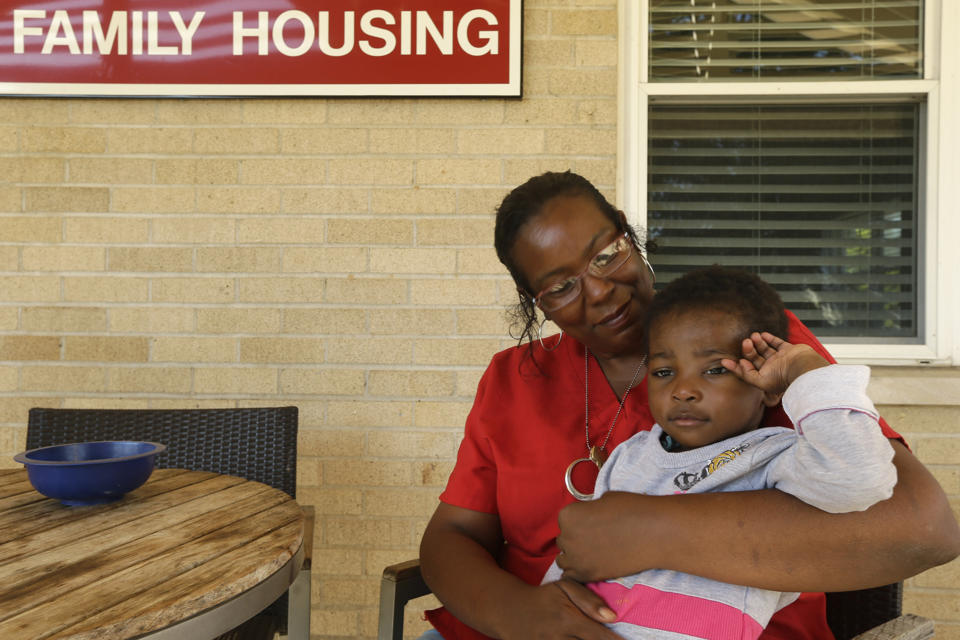[Versions of this story were published by the Associated Press, ABC News, and CBS News.]
LITTLE ROCK, Ark. (AP) — As the partial government shutdown rolls on, programs that rely on federal money are feeling the strain — and so are the people who depend on their services.
For 16-year-old Alishe’ah Sockwell, federal money makes a big difference.
It helps put a roof over her head. It allows her mother, Nia, to undergo job training. And it pays for childcare for Sockwell’s young daughter so that Sockwell can go to high school every day in Little Rock, Ark.
But with some federal funds out of reach because of the shutdown, Sockwell may have to stay home from school in order to watch her daughter. If the shutdown drags on much longer, her housing could be in jeopardy, too.
So, to fill in the gaps, the nonprofit organization that provides Sockwell and other homeless people in Little Rock with childcare, shelter and other assistance, has asked community members to chip in.
Donations trickled in for that organization, called Our House, and something similar is happening around the nation.
Across the country, donors big and small are opening their wallets to help keep afloat programs that protect people in need as the government shutdown persists. A pair of Texas philanthropists pledged up to $10 million to help Head Start programs for poor children hurt by the shutdown. A university in New Hampshire decided to offer scholarships to active-duty military personnel whose tuition assistance has been switched off by the shutdown. And in Arkansas, people have been donating to Our House.
But those donations aren’t enough to cover the federal funding tied up by the shutdown that began Oct. 1.
The National Head Start Association’s executive director, Yasmina Vinci, said in a statement that angel investors “cannot possibly offer a sustainable solution to the funding crisis threatening thousands of our poorest children.”
Our House in Little Rock initially asked for money and gift cards after the shutdown froze stipends for workers funded through the federal service program, AmeriCorps — lest those people helping the homeless become homeless themselves.
Matt Dozier, who lives in nearby Sherwood, pitched in right away.
“They’re doing something important, and you’ve got to make sure that keeps happening,” Dozier said. “You can’t let something like (the shutdown) kill it.”
About a week into the shutdown, organizers at Our House found out that the situation was even worse. The shutdown was also affecting funding for some of their housing, childcare and job-training programs.
For now, Our House is working to keep housing open for 13 families, including the Sockwells, but barring more donations or an end to the shutdown, they’re going to have to start making cuts.
“Without some donor stepping in and saying, ‘I will cover that $110-a-week cost for your child,’ … without that, their childcare goes,” said Georgia Mjartan, Our House’s executive director.
Without childcare, Sockwell, who wants to become a nurse someday, would likely have to miss school.
“Right now, my grades are so good,” Sockwell said as she sat by her daughter, Heaven, who turns 2 next month. “Missing one day already messes up a lot … and if I miss, let’s say, two days in one week, I’m really going to be behind.”
For Teshia James, who had a baby just this month, the shutdown could cut off childcare and potentially jeopardize the family housing where she lives with her husband, newborn and three other children at Our House.
“It’s crazy that we have to go through unnecessary worries because of people and something that they could take care of. But they want to make it difficult,” said James, who is 25.
So, Our House is reaching out yet again, trying to find the funds to make do if the shutdown doesn’t end soon.
A dropdown menu on the organization’s webpage now includes “Fill the Gap — Government Shutdown Assistance” as one of the places where donors can designate funds.
But it’s not clear how long people will continue to donate.
“We’re sort of asking ourselves: How many times can we go back to the community who has already been so generous … and say, ‘Oh, by the way, we have another need and another need and another need,'” Mjartan said. “We can’t do that. We can’t send out a call to action every week, saying, ‘Help us. Help us. Help us.'”
___
Associated Press writer Rik Stevens contributed reporting from Concord, N.H.
___
Online:
https://ourhouseshelter.org/donate
___
Follow Jeannie Nuss on Twitter at http://twitter.com/jeannienuss

